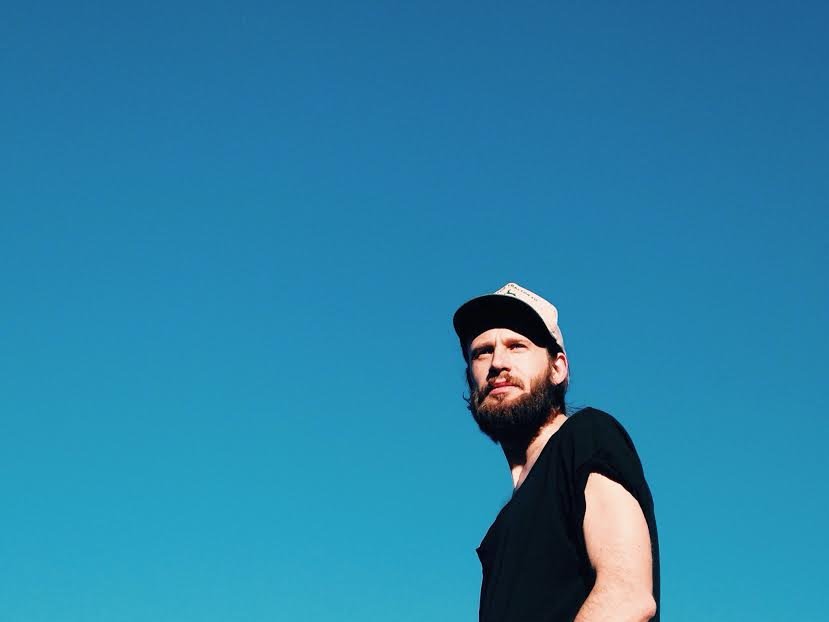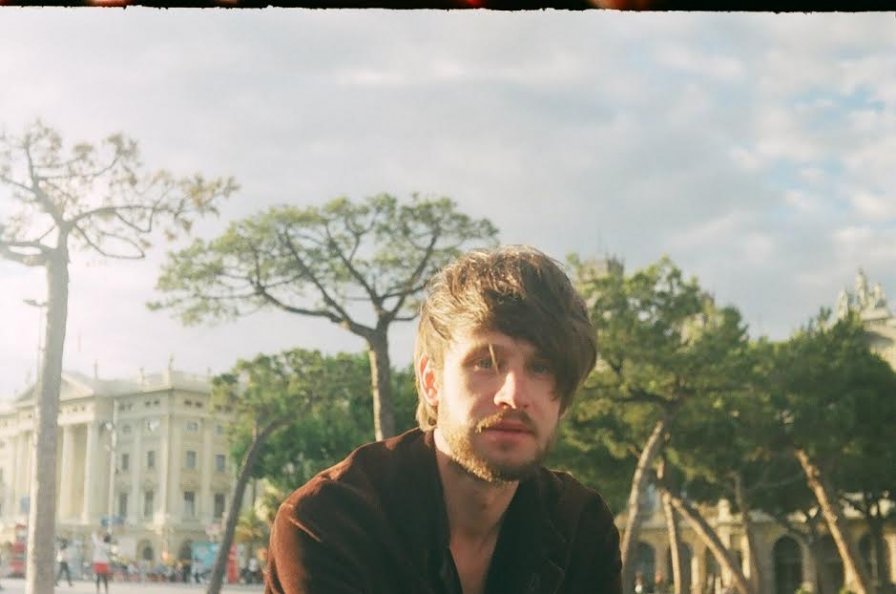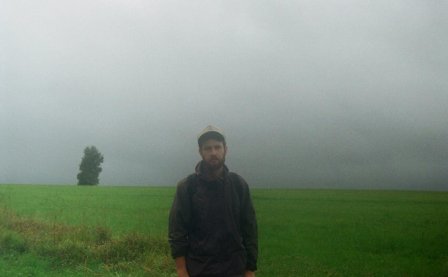The resurgence of ambient and New Age music could have not have more perfectly aligned with the rise of Bandcamp and SoundCloud. Bedroom producers operating out of any corner of the globe can put together their mellow tunes and instantly grant access to the world. One such artist in particular, Russia’s X.Y.R. (a.k.a. Xram Yedinennogo Razmuwlenuja, a.k.a. Vladimir Karpov), stands out. Over the course of several full lengths, cassettes, and limited CD releases, Karpov has taken a historical theme, be it Robinson Crusoe, early Arctic exploration, or the myth of El Dorado, and crafted understated tonal zones that invite you in with their warm, organic vibe.
Mental Journey to B.C., his latest album, is out now via Not Not Fun, and it is a gem of “humid loops of Formanta Mini and smoke-ring keys float over hushed jungle metronomes and moonlit field recordings,” as the label says. I exchanged emails with Vladimir around the beginning of the new year to pick his brain about all things X.Y.R.
I understand the X.Y.R. moniker comes from Gogol’s “Dark Souls.” Can you explain how you decided on the name for this project?
Initially I didn’t plan on creating a project. Everything began when I decided to write the soundtrack to my own summer — and that became the Robinson Crusoe LP. I actually planned doing all this anonymously. It was supposed to be a kind of ‘lost recording’ (or found); the work of an unknown author, all about Crusoe’s story. When it came to publishing everything, I realized that I’d need a stage-name. It’s necessary if you want to put anything on Bandcamp — so I reached a certain compromise and invented a bizarre abbreviation from the letters XYR. They represent the Russian phrase ‘Temple of Solitary Thought.’ I like one of the characters in Gogol’s ‘Dead Souls,’ who gave that name to a little summer house where he’d sit alone and ponder the world. I thought the same phrase would suit me, too. Now it’s used both for my music and the project overall.
Many of your album titles and artwork have a concept revolving around a historical event, place, or person. At what point in making an album do you come up with the concept?
The concept behind an LP is something I’ve always found interesting. I create a theme that appeals to me, and anything resembling a storyline comes later. The ideas develop slowly…
When forming an album’s concept, do you do any research into your potential topic?
I usually choose a theme that’s already familiar to me. Nonetheless, I sometimes have to do some research, all in the name of verisimilitude. For example in the Crusoe LP, each track is named after a chapter in the novel. I couldn’t remember all the titles by heart without some kind of research.
I have to ask, but are you a history buff?
Not at all. I actually prefer inventing my own stories.
The Bandcamp page for each album states the time span for recording. Can you provide an insight into your recording process? Do you produce a lot of material in the making of an album? The El Dorado extras tape comes to mind when I ask this.
I state the time needed to create, record, mix, and master the material — all the way from the first to the last composition. I typically work out the general storyline and decide how many tracks are needed to build an album. Then I start making the required number of tracks. On the subject of El Dorado, the whole album was ready much earlier and while I waited to release it, I had some additional ideas. I used them to wrap up the narrative.
Not Not Fun wrote of Mental Journey to B.C. that it “less conjures a place than a time.” How did you approach this album compared to your previous work? What people, places, or things in history inspired you, thematically and musically?
I’d be inclined to associate my works less with a time or place, and more with a mood or atmosphere. That’s true of Mental Journey to BC. It’s a more rhythmic work, where I used a Roland Rhythm Composer TR 626, a real piece of vintage 80s drum machine. It’s also the first work that went through professional mastering, thanks to Alex Nagel.
I wasn’t inspired by anything special. I just drew upon all my experiences over many years. There were fragments of children’s fantasy movies, bits of music from TV science shows, and books I’d once read. Everything was used to build a fixed image in my head — and that’s what I tried to transmit via the album.
What drew you to making ambient music, and are there are milestone influences that pushed you in that direction?
I listen to all kinds of music — a process that has taken up almost my time! Nonetheless, there’s never enough time to evaluate everything properly. I gradually came to the conclusion that most musical movements are fleeting. So I tried making a certain selection, and I’d end up with most important recordings, the ones I’d enjoy forever. Things that would always remain relevant. That meant I kept a lot of ambient, classical, and film score. I also chose plenty of instrumental or electroacoustic stuff, together with ‘ethnic’ records. I remember, even as a kid, that I enjoyed the music used in Soviet children’s sci-fi films and animation. That means composers like Eduard Artemyev, Yevgeny Krylatov, Alexander Zatsepin, Aleksey Rybnikov, and others. Among classical composers, I prefer Schnittke, Satie, J.S. Bach, Part, etc. My true discovery of ambient came later, when I came across Eno — which in turn led me to other aspects of ambient sound (Schultze, Budd, The Orb, F.S.O.L., B.O.C., Roedelius, Popol Vuh, Banco de Gaia…). But I didn’t yet want to work that way. In fact I don’t think I’ve ever made true ambient material. I’ve simply taken some ingredients from each directions and mixed an ‘ideal cocktail’ for myself.
The last artists who inspired me to start a project of my own were probably people like Panabrite, Peaking Lights, Ducktails, and Lybomyr Melnyk.
What is the climate for ambient and New Age music in Russia? Do you go to many shows or play live yourself?
In Russia, the demand for music like mine is small. Only over the last couple of years have we seen the numbers grow — to a point where there are sufficient artists or labels for underground gigs and festivals. I don’t yet take part in all that myself. I don’t think that mainstream Russian audiences are yet ready for this kind of music, especially not on stage.
You’ve released music through a handful of esteemed U.S. labels, such as Not Not Fun, Constellation Tatsu, and Illuminated Paths, and there has been a lot of praise from U.S. and U.K. press. What has been the response to your music in Russia?
It goes without saying that things are tougher in Russia — but there have been some positive comments and good press. The first people were from the young Moscow label Singapore Sling Tapes. They put out my first two albums. My material has always been covered by the progressive webzine Metropol. There’s also a recently created Moscow label Terminal Dream; they wanted to work with me — so there will be a compilation in February with my track. The young Yaroslavl label ΠΑΝΘΕΟΝ and St. Peterburg label Floe Tapes have proposed a collaboration, also. All of that leads me to view the future with optimism.
Can you tell me about your partnership with Not Not Fun? How did you first come into contact, and how familiar were you with the label?
I’ve followed the label for a long time — and always liked what they do. I’m never the first person to write, though. I’m too modest… So Britt wrote to me, one fine day! He praised my work and proposed a release on his label. I was both pleasantly surprised and flattered. We discussed a few details and then I went to work. A little later I sent in my demo — which got his approval. It all became a release on Not Not Fun. We both enjoyed the collaboration and decided to keep going in the same spirit. I’ve been satisfied with the whole process.
You had three releases in 2015 (El Dorado, waves t*pes vol. 1, and Mental Journey). Can you shed some light on what we can expect from X.Y.R. in 2016 and beyond?
Two compilations should appear early in 2016 with my music. One is on the Moscow label Terminal Dream, and then something with Albino Deers on Nekubi Tapes. There’s something additional coming soon on the Canadian label Jeunesse Cosmique — the Waves T*pes, Vol. 2. Later this year I intend publishing the third Waves T*pes, a ‘Tourist’ album, and maybe even something else on Not Not Fun. Those — in general terms — are my plans for the near future.



More about: X.Y.R.



